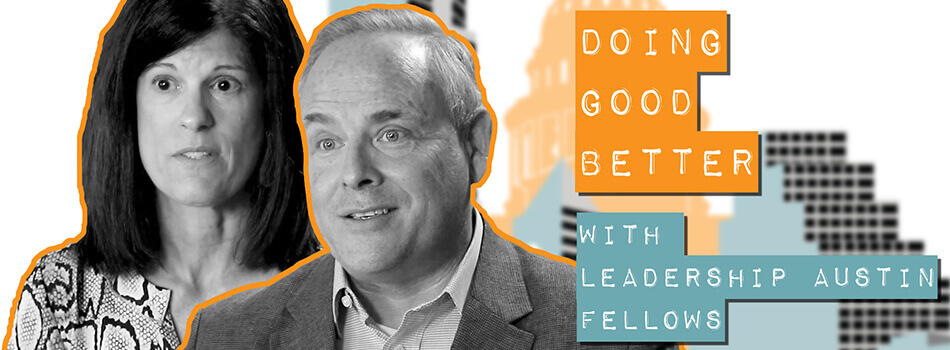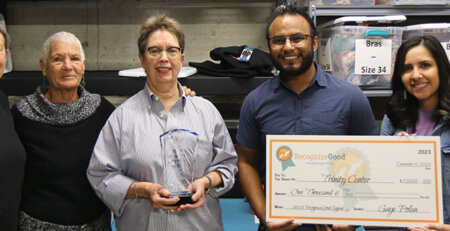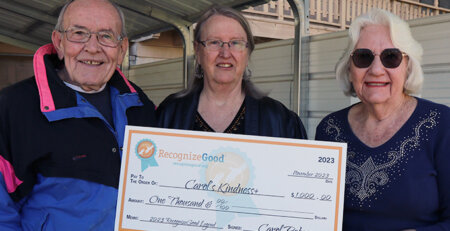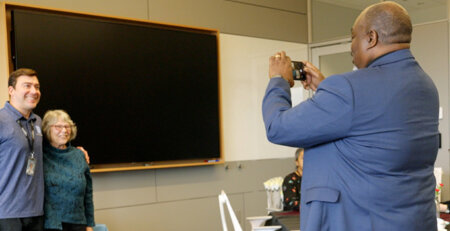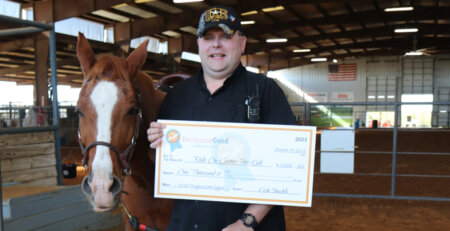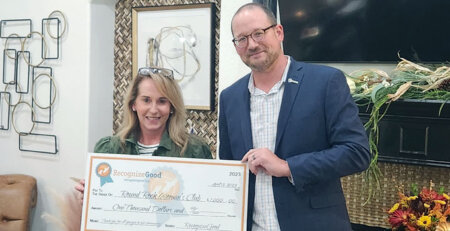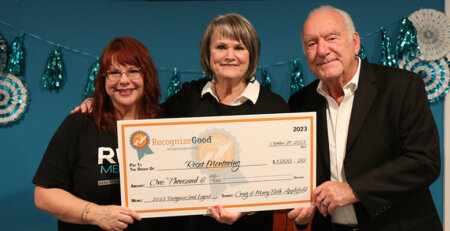Doing Good Better: Leadership Austin Fellows – Paula Klante + Meals on Wheels Central Texas
People do good for others every day in the community surrounding Austin. At RecognizeGood, our mission is to help strengthen that community by sharing those inspiring examples. In our Doing Good Better series, we take a docu-series look into innovative collaborations around the Austin area that make our community stronger. Leadership Austin launched a pilot Fellows Program to connect experienced retirees with sustainability-building projects that nonprofits often don’t have the resources to execute. Projects that require a different caliber of candidate.
Longtime technology consultant Paula Klante was paired with Meals on Wheels Central Texas to guide a massive migration of data and technology from a legacy system to a cloud-based Salesforce platform to ensure sustainability into the future. We spoke with Paula and Meals on Wheels COO Michael Wilson about their Fellowship experience.
“If there were 25 Fellows out there making this kind of impact on each of the nonprofits that they were working with, it would just be such a multiplier – again, not just helping with the challenges today, but helping to improve the organizations and agencies and build that capacity for going forward. I think the benefits would be enormous.”
RecognizeGood: Was there a sense of urgency to this project?
Michael Wilson, COO at Meals on Wheels Central Texas: Absolutely, the urgency of this project was enormous. When we looked at our staff and the resources that we had in-house, we realized it was going to be an enormous challenge. We began running the budgets and putting a plan together for this project. When Leadership Austin offered us this opportunity, it was like … it was a magic confluence of things. By bringing in a Leadership Austin Fellow to help us with this, we would be able to begin to actually move ahead of our timeline and get this project underway faster then we thought would be possible. That was something that was super exciting for us. As we started talking with the Fellows, we became even more excited – in the end we really discovered an expert that would be able to help us with this Salesforce project.
RG: Did you have any alternatives?
Michael: There would have been challenges around fundraising, and we would have had some tough decisions around the constraints of a budget on a project like this. This project gave us the opportunity to really bring in someone who could help us not just on executing the Salesforce project, but help us think at a higher level about impacts throughout the organization. And that’s really what Paula, our Fellow did for us – she said ‘Alright, let’s pull out of the weeds of this project and look at the impacts that this has across the organization – security around HIPAA, around managing all this personal health information (PHI). She helped us in a way that was transformational for the work that we’re doing, because technology is the name of the game right now – building efficiencies, and building a better way to get those meals out the door to the people who need them.
RG: With Paula as a local expert, and not some third-party tech outsourcing situation, did it feel more collaborative? More personal, or customized?
Michael: Well, it was exactly like having another team member. It wasn’t just retaining someone to do some work for us. It was really bringing someone in who had the time and had the interest in understanding the organization, understanding the people that we serve, and understanding the commitment that nonprofit staff have for their mission. She really got to know who we are, who our clients are, and how we do our work on a day-to-day basis. And that’s really what made the relationship so wonderful. She really knows how we do the work and what needs to get done. I think that’s one of the great things about this kind of project; it really brings someone into the organization and makes them part of the team, as opposed to just being someone who’s retained to do some work.
RG: Paula, despite lots of volunteer experience I’m guessing you had never worked with nonprofit to quite this extent before. What was the difference for you between ‘normal’ volunteering and throwing yourself into this Fellowship?
Paula Klante, Leadership Austin Fellow: This technology fellowship was a full-time commitment! Helping to understand the requirements, then helping through the planning stage, and then the implementations and final rollout. It was a much more than just ‘an hour here, an hour there’ from a volunteer perspective. But that enabled me to kind of get into the organization, and to really understand what the needs were, understand what could or couldn’t be done, and hopefully then help solve the challenges.
RG: Assuming there is a payoff to that sacrifice in basically taking on a full-time job, what makes it worth it? What is the payoff?
Paula: Well, coming from a technology background, I understand certainly the benefits of technology. And what I’ve seen with other nonprofits is often that’s an under-invested area. They don’t necessarily reap the benefits of what technology can do. There’s a kind of a capacity-building in the technology area that has a “pay it forward” in multiple dimensions, and it certainly did for Meals on Wheels with this project. They can better serve their clients and hopefully serve more clients. Second, there’s an internal efficiency – they were siloed, but now they are able to have better collaboration and cooperation. Thirdly, they can better lay the foundation for where they want to go in the future. Data is such a valuable asset for an organization like Meals on Wheels to have, and then to really be able to take that data and use it to move the mission forward into the future – that’s where I think it was worth it from my perspective, to be able to serve more of their clients in need right now, but then also lay that foundation for better efficiency and opportunities going forward.
RG: Michael, what do you think made the partnership the success it was?
Michael: I think the way Leadership Austin went about matching Fellows with organizations and projects was crucial in making sure the right people were applying for the right job at the right organization. It’s that level of detail and interest in the work that needs to get done. These people that nonprofits are able to bring to the table can really make a big impact, these professionals in the community that are willing to give back. When they decide to step away from the daily rigors of work, and they want to give back to the nonprofit organizations in the community, it’s a great opportunity for impact. As the nonprofit, we know we’ve got an expert that wants to help us out. As long as we can communicate the scope of the project, that’s all it takes.
RG: Paula, do you feel like the focus on the work created a shared purpose between you and the Meals on Wheels staff? Or a point where you realized you were ‘supposed’ to be together?
Paula: I think it was when I first met them. As part of the interview process, I realized that there was a good connection – they seemed to know what they needed to have done and had a good vision of where they were taking the organization. I can certainly see how technology and my skills could help them move forward.
RG: Paula, so how did this end up in your lap to begin with? Did you bump into Christopher Kennedy? Did you see an email that looked intriguing and click through? How did you decide to jump into this?
Paula: Well, I know Debbie Johnson – we both served on the Impact Austin board together and she lives in the same neighborhood as I do. I bumped into her and she was explaining the program, and the specific Meals on Wheels opportunity, and their need from a technology capacity to move off of a legacy system to Salesforce. I had done a little a bit of Saslesforce work with a couple other nonprofits and my background is technology. It seemed like a good fit.
RG: And Michael, you heard about the program from Debbie too, right?
Michael: We heard about it from Debbie. And it was something that was very exciting for us because it opened the door for an opportunity to bring someone in – someone who could really help us overcome cost, help us fill an expert role, and help us manage a project that we knew was going to have a very large scope.
RG: What would happen if there were 25 Paulas out there able to help nonprofits solve these sorts of problems?
Paula: If there were 25 Fellows out there making this kind of impact on each of the nonprofits that they were working with, it would just be such a multiplier – again, not just helping with the challenges today, but helping to improve the organizations and agencies and build that capacity for going forward. It’s hard to imagine what that would do across the city – we would be able to serve more at-risk people, children, seniors, pets, what have you. I think the benefits would be enormous.
RG: What’s your reason for giving? Why not just sit on the couch all day? Why choose to give so much of your time, talent, and treasure?
Paula: I’ve been very fortunate in my life. Now that I’m at a place where I have the opportunity to give back, I think I should give back. I think that’s just the way I was raised. It’s extremely important to help those around you and this is this is a good way to do it. It’s being able to apply your talents and help other organizations.
Have a great example of someone in the Austin area doing good better? Let us know!
